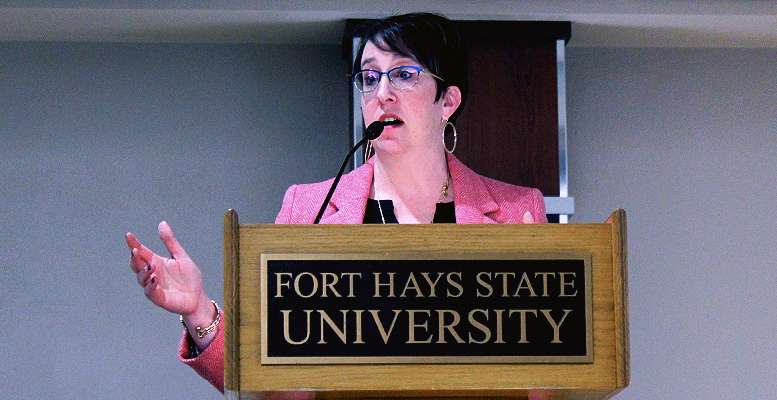
By CRISTINA JANNEY
Hays Post
Farm income is on the decline and that is causing significant financial stress on Kansas farmers, a K-State professor told a conference on farmer mental health Feb. 8 at FHSU.
The event was sponsored by High Plains Mental Health with the assistance from a grant from the Robert E. and Patricia A. Schmidt Foundation.
Dr. Mykel Taylor, associate professor at K-State, specializing in agricultural economics, set the stage for the conference by explaining one of the most significant stressors in the ag culture — money.
"There has been a change in the demeanor of farmers from being very positive to being very reserved," she said.
Between 2014 and 2017, the suicide rate in the 20 northwest counties served by High Plains Mental Health increased by 64 percent.
SEE RELATED STORY: Panelists sound alarm on farm family stress, mental health
Ninety-one percent of farmers and farm workers reported finances as a significant issues, said Kimberly Nelson, regional administrator for the Substance Abuse and Mental Health Service Administration.
Eighty-seven percent of farmers and farm workers said cost of treatment was a barrier to seeking treatment for mental illness, which topped the list of barriers, Nelson said.
Taylor said returns have declined on wheat, corn, sorghum and soybeans. However, the costs for machinery and to purchase land have increased.
"We have moved from boom to bust, and it has happened very quickly," she said.

The statewide average for farm income peaked at about $130,000 per year. But in 2018, the statewide average for net income fell to $100,000.
However, those were averages and income varied depending on what part of the state you lived.
In 2015, 67 percent of farmers made less than $50,000 per year. Taylor said this is a sobering statistic considering the average farm family has about $70,000 per year in living expenses.
The fastest growing expense in the farm family budget is health insurance, she said.
Another indication of the struggling farmer came from bankruptcy filings — 35 in 2018. This was the highest number in Kansas since 1996. However, farm bankruptcies in the last two years are still well below the numbers seen in the 1980s during a major collapse of the farm economy.
Farmers are seeing higher costs of production, which is causing cash flow problems. Debt levels are on the rise, Taylor said, and farmers are looking at alternative crops as the price of wheat continues to be depressed.
The federal government funded special payments to farmers affected by the trade war in 2019. The average Kansas farmer received about $58,000, which accounted for 50 to 58 percent of farm income that year.
However, there are no planned federal payments under this plan for 2020.
"I think 202o is going to be scary," Taylor said. "If we have bad or average weather and not great commodity prices, it is going to be hard on producers."
Seeking help
High Plains Mental Health has a 24-hour crisis line that can be reached at 1-800-432-0333. The National Suicide Prevention Lifeline is 1-800-273-TALK (8255). The national suicide crisis text line can be reached at 741741.
To make appointments at High Plains, call the main telephone line at 1-800-432-0333 or 785-628-2871. Branch office phone numbers can be found on the High Plains website.
Other resources
- KS/IA Regional Ag Concern Hotline: 1-800-447-1985
- FarmAid Hotline 1-800-FARM-AID
- Rural Advancement Foundation International Farmer Crisis Hotline 1-866-586-6746
- Kansas Ag Stress Resources kansasagstress.org
- National Farmers Union Farm Crisis Center farmcrisis.nfu.org






